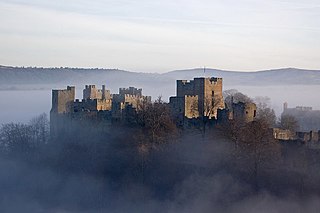Related Research Articles

Richard Zouch was an English judge and member of parliament from 1621 to 1624. Born at Ansty, Wiltshire he was educated at New College, Oxford and later married Sara, daughter of John Harte of Brill. He was elected Member of Parliament for Hythe in 1621 and later became principle of St. Alban Hall. During the English Civil War he was a Royalist and was appointed by Oliver Cromwell to a special commission of oyer and terminer. Zouch wrote extensive legal texts and was among the earliest systematic writers of International Law

Ludlow Street runs between Houston and Division Streets on the Lower East Side of the New York City borough of Manhattan. Vehicular traffic runs south on this one-way street.

Tobias Matthew, was an English nobleman and bishop who was President of St John's College, Oxford from 1572 to 1576, before being appointed Vice-Chancellor of Oxford University from 1579 to 1583, and Matthew would then become Dean of Durham from 1583 to 1595. All three positions, plus others, were appointed to Matthew by Elizabeth I. Eventually, he was appointed Archbishop of York in 1606 by Elizabeth's successor, James I.
Kenneth Turpin was a Provost of Oriel College, Oxford from 1957 to 1980. He was Vice-Chancellor of the University of Oxford from 1966 to 1969.

The Oxford and Cambridge Club is a traditional London club. Membership is largely restricted to those who are members of the Universities of Oxford and Cambridge, including men and women who have a degree from or who are current undergraduates of either university.
Richard Ludlow English is a historian and political scientist from Northern Ireland. He was born in Belfast.

Robert de Stratford was an English bishop and was one of Edward III's principal ministers.
John Ludlow may refer to:
Events from the 1190s in England.

Pain fitzJohn was an Anglo-Norman nobleman and administrator, one of King Henry I of England's "new men", who owed their positions and wealth to the king.

Josce de Dinan was an Anglo-Norman nobleman who lived during and after the civil war between King Stephen of England and his cousin Matilda over the throne of England. He was a landholder in the Welsh Marches when he was married by Stephen to the widow of Pain fitzJohn, a union that gave Josce control of Ludlow Castle. Control of the castle was contested by other noblemen, and the resulting warfare between the nobles forms the background to a late medieval romance known as Fouke le Fitz Waryn, which is mainly concerned with the actions of Josce's grandson, but also includes some material on Josce's lifetime. Josce eventually lost control of Ludlow and was granted lands in compensation by Matilda and her son, King Henry II of England, who succeeded Stephen in 1154.
John de Northwode was an English medieval churchman and university chancellor. He was the son of John de Northwode and Agnes, daughter of William de Grandison; and nephew of John de Grandison.
William de Hawkesworth was an English medieval college head and university chancellor.
William de Montfort was an English medieval Canon law jurist, singer, dean, and university chancellor. He was apparently the son of Peter de Montfort.
Sybil was an Anglo-Norman noblewoman in 12th-century England. Her parentage is unclear, but her first marriage to Pain fitzJohn is well attested. Through her marriage, Sybil transferred lands in several shires to her husband, including lands around Ludlow Castle and the castle itself. After Pain's death in 1137, Sybil attempted to retain control of Ludlow and her lands but in 1139 King Stephen of England married her to Josce de Dinan, who died in 1166. Sybil had two daughters with Pain, and is probably the mother of Josce's two daughters also. Sybil's marriage to Josce, and his control of Ludlow in right of his wife forms the background to a medieval Welsh romance, Fouke le Fitz Waryn.
Herbert Edward Whately MA Oxon was an Anglican priest: he was Archdeacon of Ludlow from 1939 to his death.
Edward William Whately was an Irish Anglican priest: Archdeacon of Glendalough from 1858 to 1862; and Chancellor of St Patrick's Cathedral, Dublin from 1862 to 1872.

Wardour Castle in Wiltshire was besieged twice during the First English Civil War; once in May 1643, and then again between November 1643 and March 1644. During the first siege, a Parliamentarian force of around 1,300 men led by Sir Edward Hungerford attacked the castle, which was the home of Thomas Arundell, 2nd Baron Arundell of Wardour, a prominent Catholic and Royalist. Arundell was absent, fighting for King Charles at the time of the attack, and the defence was led by his wife, Lady Blanche Arundell, in command of 25 soldiers. The siege was started on 2 May, and lasted for a week before the Parliamentarians forced Lady Arundell to surrender on 8 May. The Parliamentarians garrisoned the castle with 75 men, led by Colonel Edmund Ludlow.
References
- ↑ Hibbert, Christopher, ed. (1988). "Appendix 5: Chancellors of the University". The Encyclopaedia of Oxford . Macmillan. pp. 521–522. ISBN 0-333-39917-X.
- ↑ Wood, Anthony (1790). "Fasti Oxonienses". The History and Antiquities of the Colleges and Halls in the University of Oxford. p. 15 – via Internet Archive.
| Academic offices | ||
|---|---|---|
| Preceded by William de Kingescote | Chancellor of the University of Oxford 1290 | Succeeded by John of Monmouth |
| This article relating to the University of Oxford is a stub. You can help Wikipedia by expanding it. |
| This biographical article about an English academic administrator is a stub. You can help Wikipedia by expanding it. |